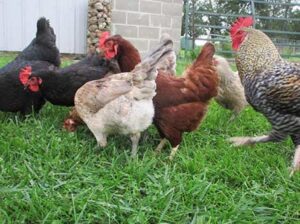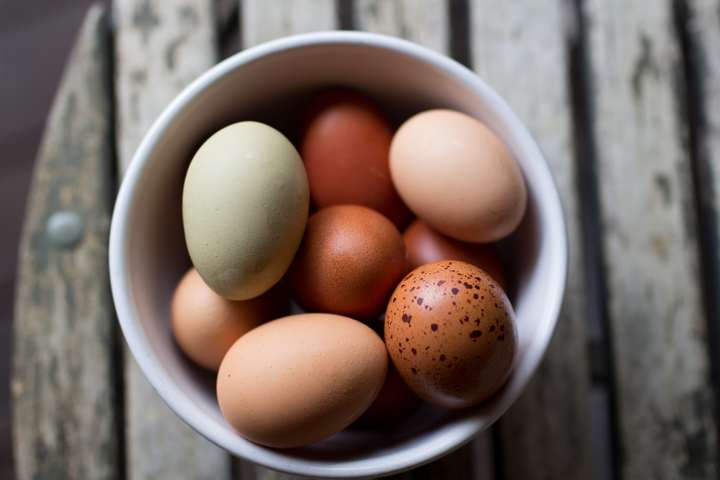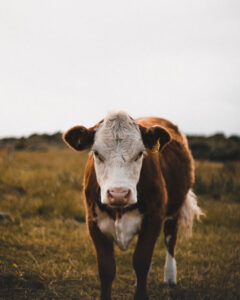This article is part of our Nutrition + Dining series. Here we explore holistic health topics and share favorite dishes from aligned restaurants.
"What the cluck" said the factory-farmed bird...
“Cage-free? Free-range?” “They may be ‘skange‘!” exclaimed my Dad, many moons ago.
He always has a way with words and is ever the nutrition info pioneer. (I came by it honestly!)
His words are now more relevant than ever, with big business cashing in on consumer demand for natural and organic products.
When you hear “Organic”, “cage-free” or “free-range”, you may picture happy chickens roaming the hills in glorious sunshine pecking at grasses, bugs, and insects per their nature.
And sometimes this picture is spot on. But often the reality is quite different.
Cage-free can indicate a crammed barn with clipped-beak hens to avoid stressed eyes from being poked out — but hey, no cages! And free-range indicates there exists an opening for outdoor access – although that opening may be small and unreachable for many inside a packed hen house.
And while “Organic” does indicate a better feed for the chickens, it does not regulate confinement or living conditions.
Which brings us to our reason #1 why you should eat sustainable pasture-raised eggs: they’re more humane and better for the animals.


Chickens raised naturally on fresh grasses, bugs, insects, and scraps plus Organic/non-GMO supplemental feed as needed are happier and healthier.
Buying eggs from a producer of truly pasture-raised chickens supports a more virtuous cycle for the animals.
An eggcellent topic: superior nutrition in pasture-raised eggs
As it turns out, healthier happy hens raised the way nature intended create a better product with robust nutrition. In pastured eggs vs non-pasture raised eggs, studies have revealed:
* A preferable Omega 3: Omega 6 profile, with 2.5x the Omega 3s1
* An increase in Vitamin E, providing important antioxidant protection
* Increased Vitamin D3, likely from the increased natural sun exposure the pasture-raised hens enjoy2

care of pastured hens on Willow Farm, Homer, MI
And don’t forget how great those choline-rich yolks are for your brain. Choline keeps your neurotransmitters firing and your brain sharp.
Reason #2 for why you should eat pastured eggs from sustainable farms: they’re more nutritious, and better for your body.
Eggceptional regenerative farming: pasture-raised is better for the planet.
Did you know? Chickens, cows, and pasture farmland have a symbiotic relationship.
The cows graze and create natural fertilizer (manure) for farmland. Of course, pesky flies and bugs are attracted to the cows and cow paddies. Roaming chickens come behind the cows to peck and eat up the resulting insects and fly larvae.
The chicken manure further provides nitrogen-rich fertilizer.
When combined with rotational grazing, such practices form a healing natural system that restores the land and provides nutrient-rich soil for future planting.

Reason #3 for eating pasture-raised eggs from local sustainable farms: they’re better for our Earth.
Eggciting flavor: richer, nutrient-dense pasture-raised eggs just taste better
Finally, it’s hard to argue with your taste buds!
Once you taste the difference, it’s hard to go back.
Organic pasture-raised eggs are arguably richer and more delicious.

Reason #4 for eating pasture-raised eggs from local sustainable farms: they’re simply delicious! Better for the soul we say… 😉
Note: “pasture-raised” is not a regulated term, so it’s key to know your seller. “Organic” and “Certified Animal Welfare Approved by AGW” are helpful regulated labels while “Demeter Biodynamic” is best. Many small sustainable farms have no labels – they just have happy hens and really good eggs. 😉
Tracking all the good eggs out there...
We’re fans of all things healthy, sustainable, and delicious – particularly in keeping to a whole-food, anti-inflammatory lifestyle.
Beyond where to find pasture-raised eggs on menus near you, our Mobile App tracks where to find beautiful nutrient-dense salads, veggies, and much more.
Don’t miss your chance for priority access! We’re live throughout SF Bay Area, NYC, LA, Denver/Boulder, and more per demand.
Subscribe now for access and tell us where you want us next.
Our first 500 subscribers enjoy a discounted annual rate ($29.99) as thanks for your early support!
Get the Healthy Anywhere App

iOS mobile: App QR code
Not ready to join?
Let us know where you want us and get notified when we’re live near you.
Related reading
Discover the best healthy, sustainable, and delicious food near you.
Healthy Anywhere
Conscious. Clean. Curated.™
References
- Karsten, H., Patterson, P., Stout, R., & Crews, G. (2010). “Vitamins A, E and fatty acid composition of the eggs of caged hens and pastured hens.” Renewable Agriculture and Food Systems, 25(1), 45-54. doi:10.1017/S1742170509990214
- Kühn J, Schutkowski A, Kluge H, Hirche F, Stangl GI. “Free-range farming: a natural alternative to produce vitamin D-enriched eggs.” Nutrition. 2014 Apr;30(4):481-4. doi: 10.1016/j.nut.2013.10.002.


Pingback: 7 Great places to enjoy a Healthy Breakfast in the Bay Area | Healthy Anywhere
Pingback: Regenerative farmer Q&A: pasture-raised eggs and animals